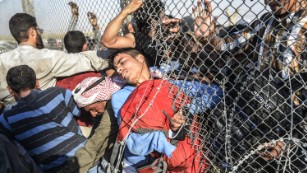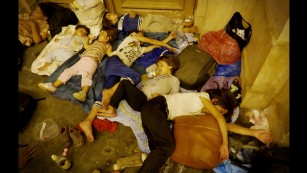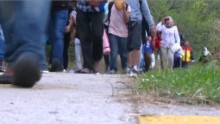U.S. to take at least 10,000 more Syrian refugees
President Barack Obama has ordered his administration to "scale up" the number of Syrian refugees admitted to the United States in the coming year, directing his team to prepare for at least 10,000 in the next fiscal year, the White House said Thursday.
The announcement comes amidst growing pressure for the United States to increase the number of refugees it accepts as those displaced by the raging Syrian civil war pour into Europe and other regions.
Before the White House announcement, House Democratic Leader Nancy Pelosi criticized the number of additional refugees the Obama administration had said on Wednesday that it was looking to accept -- just 5,000.
"This is really important. I think 5,000 is far too low a figure," she told reporters, referring to the amount Secretary of State John Kerry had mentioned to lawmakers Wednesday, according to Congressional aides and other sources familiar with the meeting.
The proposed resettling of at least 10,000 Syrian refugees would be allocated out of a U.S. quota of 75,000 refugee admissions slated for next fiscal year, beginning October 1, a senior administration official said.
That quota applies to refugees from all over the world and is set at the beginning of the fiscal year, but Obama can raise that quota if there's a crisis.
Already, a Senate aide said that Kerry had told senators that "they'd seek an additional increase beyond that," referring to the 75,000 quota.
Syrians break through border fence fleeing violence


"He gave a range of numbers," the aide said. Kerry mentioned a potential new total as high as 100,000, as well as other possible maximum numbers, according to the aide.
In all, about 1,500 Syrian refugees have been admitted to the United States since the start of the Syrian conflict in 2011, the vast majority of them this fiscal year.
Here's a breakdown: 23 in 2011, 41 in 2012, 45 in 2013, 249 in 2014 and 1,199 so far this fiscal year, which ends September 30, according to the State Department figures as of September 4.
About 300 more refugees are expected to be admitted by the end of this fiscal year. This equates to a grand total of about 1,800 refugees from Syria's four-year civil war being admitted to the United States by October 1, according to U.S. officials.
Human rights groups have called on the U.S. to accept 65,000 Syrian refugees by the end of next year. Last spring, Democratic lawmakers wrote to Obama asking him to "significantly increase" the number of Syrians permitted to resettle in the U.S.
Kerry and Assistant Secretary for Population, Refugees and Migration Ann Richard told lawmakers that they could come back to seek congressional agreement, or an "emergency exception" to bring in more refugees, a source familiar with the meeting said. A congressional aide said Kerry suggested he could return to Congress to ask for their support for admitting as many as 30,000 more refugees.
"We are looking hard at the number that we can specifically manage with respect to the crisis in Syria and Europe," he said after the meeting. "That's being vetted fully right now."
A senior State Department official briefing reporters said there were "varying views among lawmakers present at the meeting about accepting more refugees." The official said Kerry proposed "a range of different numbers."
"The thinking all along this year was we could move to increase it, some sort of a modest increase," the official said. "Given what's going on in the world today, I know that there's a lot of people outside the administration, and inside the administration, too, in very senior positions, who would like to increase it significantly."
Syrian refugees: Which countries welcome them, which ones don't
The official added: "The question becomes, will Congress support that? Can we move this process that we have, that doesn't turn on a dime, to start bringing larger numbers sooner? That's hard."
The official added the main objective of the resettlement program was to ensure refuges admitted to the United States return home once the conflict ends, which was difficult to do when they were resettled so far from home.
In a statement after the meeting, Senate Judiciary Committee Chairman Chuck Grassley, an Iowa Republican, expressed his concerns.
While he said Kerry was seeking a "reasonable increase" in refugees allowed into the U.S. for the coming year, referring to the 5,000 figure, he added that "when pressed, the administration indicated that they were considering opening the floodgates and using emergency authority to go above what they proposed to Congress in today's consultation."
He continued, "Before agreeing to accept tens of thousands of Syrian refugees, the Obama administration must prove to the American people that it will take the necessary precautions to ensure that national security is a top priority, especially at a time when ruthless terrorist groups like ISIS are committed to finding ways to enter the United States and harm Americans."
Vetting the Syrian refugees has been a problem.
The U.S. relies on U.N. lists of refugees who are deemed safe candidates for resettlement, but the screening process can take between 18 and 24 months and strains the resources of the Department of Homeland Security and Customs and Immigration Services.
Director of National Intelligence James Clapper said Wednesday that the current migration is a "disaster of biblical proportions" that poses an opportunity for terrorist groups such as ISIS to "infiltrate operatives among these refugees."
"What we're trying to do is weed out people who are liars, who are criminals or would-be terrorists," a senior State Department official said.

Refugee gives birth, carries newborn on 11-day walk
"I believe that the President has made it clear he wants the United States -- which has always taken a leadership role with respect to humanitarian issues and particularly refugees -- to be able to do what we can," Kerry told reporters after his meeting with senators Wednesday.
"We are committed to increasing the number of refugees we take and we are looking hard at the number we can specifically manage with respect to the crisis in Syria and Europe and their migration today," Kerry said.
Kerry's meeting is part of an annual discussion the administration has with Congress to set its refugee admissions quota for the next fiscal year.
But while the meeting is routine, it comes at a time when unprecedented international attention is being paid to the issue of refugee resettlement.
More than half the population of Syria has been displaced by the ongoing civil war, and the flow of refugees in the Middle East and Europe has put a strain on countries' resources and divided local populations.
The United States has accepted just over 1,500 refugees from the crisis so far, the vast majority of them in the past year.
The rate of admissions is growing, but the U.S. is limited in how quickly it can resettle refugees because of both admissions quotas and security concerns.
On Tuesday, State Department spokesman John Kirby said the administration's response to the crisis would need to be balanced against "the proper vetting procedures to make sure that, particularly when we're bringing in people from that part of the world, that we're doing it safely and securely."
Congressional Republicans in particular have raised alarm bells for months over the possibility that Syrian extremists -- including ISIS sympathizers -- could enter country by pretending to be refugees, potentially committing attacks against the homeland.
News Courtesy: www.cnn.com











